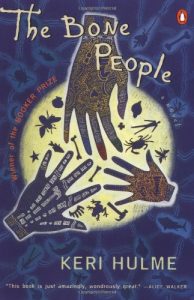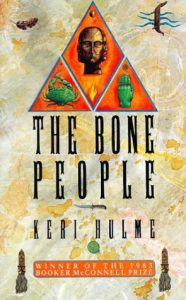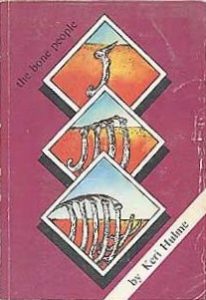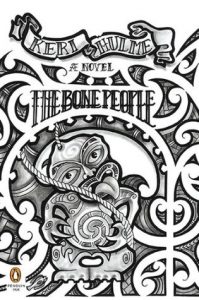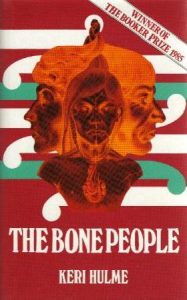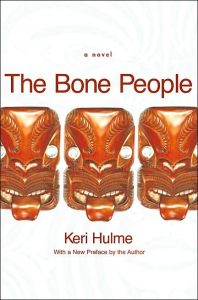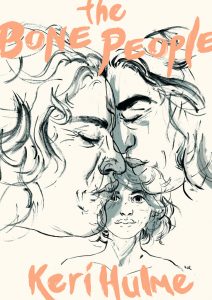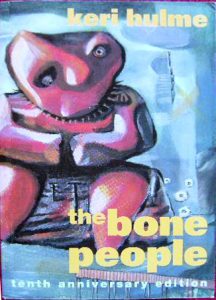The Bone People – Keri Hulme – 1984
Posted by Guillermo Maynez on 2/2/2013, 11:43:46
I’ve given up on “The Bone People” on page 175. I don’t like them. Not even the kid has inspired sympathy, Kerewin is not that likable, and Joe is a child-beater. Poor people, it seems like they have suffered much in their lives, but that suffering has not led either to redemption nor even to interesting downward slopes. People’s inner musings on their suffering may be fascinating, revealing, illumnating. Remember John Banville’s “The Sea”? a lot of musings, memories from distant disturbing facts, a lonely man recollecting thoughts. It disturbed me in a moving way. Julian Barnes’s “The Sense of an Ending” is similar: disturbing memories lead to some kind of revelation or at least a reckoning with one’s own past and one’s own self, however hard it may be. So it’s not the slow pace, it’s not the reflective mood, it’s not the disturbing situations. It’s the writing. Not good. It’s the character development, not compelling.
Haven’t I said before that one characteristic of contemporary literature that calls my attention is the lack of likable characters? This is a marked case in point. Please note that when I say “likable” characters I don’t necessarily mean “positive” or “good” characters, not even ones I agree with. The demented narrator of “The Prague Cemetery” was somehow likable in all his bigotry, anti-Semitism (anti-everything, really), and perversity. It made want to go on finding out what happened to him and the rest of the crazy cast.
Steven: I kept thinking of your co-worker and, horribly, Kerewin reminded me of women (fortunately) long lost in the past.
SO: my copy of “Njal’s Saga” is still on the way; I’m looking forward to reading it. In the meantime, I will start “Cloud Atlas”.
~
Posted by Sterling on 3/2/2013, 10:18:15, in reply to “The Bone People”
I understand that sometimes one doesn’t like a book for purely personal reasons, Steven. You may objectively see that it is a worthy work, but personally, you just don’t like it. I generally do not associate people I know with characters in a book, but I vividly recall the experience of associating a character with the woman who was then my fiancée. I was unreasonably upset when the character was killed. I certainly didn’t see that coming!
However, since I was basically not planning to read it anyway, I decided to skip that one when you didn’t care for it, Guillermo. I know, I know, I might have liked it when no one else did. Usually, though, our tastes do not diverge all that widely. I was trying to think what was the last book that we really disagreed on. I didn’t like The Prague Cemetery as much as some, but I thought it was good. Somebody (Lale?) didn’t like The Sense of an Ending as much as I, but there was not strong disagreement. Maybe someday when I run out of ideas for something to read (yeah, right!), I may try The Bone People myself just to see. But for now…
Characters who are reprehensible but interesting seems to me to link to the concept of the anti-hero. It has a long history. Thackeray seems to have particularly liked them (both Barry Lyndon and Becky Sharp are anti-heros). One could even argue that Satan in Paradise Lost is the ultimate anti-hero. Raskolnikov, Macbeth, Falstaff, etc. are early anti-heroes. Nevertheless, the 20th century (and beyond) literary novel seems to have avoided real heroes. I was trying to think what was the last literary novel we read that had a real hero. (Genre novels have heroes. Philip Marlowe is arguably a hero, though a somewhat tarnished one; the Continental Op is an anti-hero, for sure. Kivrin and/or Mr. Dunworthy? Maybe.) In the literary novels, no heroes that I can think of. de Zoet is certainly likeable, but hardly a hero. Uzaemon attempts to play the hero, but fails. Otherwise, I can think of no one. The trick of the modern novel is to create a character who either: a) we can relate to (A Sense of an Ending) or (b) has some sort of dark charisma (The Prague Cemetery). When the character has neither (C), the book tends not to be enjoyable.
~
Posted by Steven on 3/2/2013, 11:28:20, in reply to “Re: The Bone People”
A more important reason for my disliking The Bone People was something I didn’t want to mention to those who were about to read it. About 3/4 of the way through what has seemed like a gritty, realistic novel the author suddenly transforms it into magical realism by introducing a supernatural element that hasn’t even been hinted at before. She completely pulls the rug out from under the reader, and suddenly every character is magically reborn, redeemed and rehabilitated. I was prepared to like it up to that point notwithstanding the distraction of being constantly reminded of my detestable co-worker.
It isn’t at all necessary for me to like any of the characters to enjoy a novel. I think it’s immature of readers to want to find someone to identify with or admire in everything they read. I would rather see life depicted as it is.
~
Posted by Sterling on 3/2/2013, 14:00:37, in reply to “Re: The Bone People”
Immature or not, I find it necessary to care what happens to at least one of the characters in a novel. This does not necessarily imply identification, but sometimes that effect is unavoidable, especially when a character reminds you of you. It doesn’t even imply liking them, much less approving of them or wishing you were them, as children do. If I do not care what happens to any characters, as in C, the novel becomes a chore to read.
The presence of a hero does not imply that the story is somehow not “depicting life as it is.” There certainly are real-life heroes. Anti-heroes or insignificant protagonists are a 20th century convention, neither more nor less “realistic” than the conventions of earlier centuries. John Fowles really opened my eyes with The French Lieutenant’s Woman. Providing two endings, one happy in the 19th century fashion, one bleak in the 20th century fashion, allowed me to understand that what I took for superior realism in the modern novel was simply the convention of our times.
~
Posted by Guillermo Maynez on 4/2/2013, 13:54:51, in reply to “Re: The Bone People”
Another element that made me dislike “The Bone People” was the lack of a sense of humor. Certainly, as Sterling has said before, humor is something very personal and subjective, and it is affected by the use of language. And although no doubt people from different cultures (and across time!) may find the same situation or phrase funny, there is a cultural element to it. For example, for good or bad, political correctness has made that many jokes that used to make us laugh now seem reprehensible. It can be argued that every major literary work of art has some sort of humor in it. A case in point is Dostoievsky, whose novels (except “Stepantchikovo”) can hardly be described as “humorous”, yet there is a sort of irony and sarcasm that gives his works a patina of humor, bleak as it may be. Dickens, too.
But “The Bone People” takes itself too seriously, and frankly the use of language is not that inspiring or rich. All I could feel about the characters is how miserable and empty their lives were. And yes, those aspects of life are a reality and must also be described and analyzed by literature. It only needs a more profound and humane look into them, like someone like, say, Maugham, does with great success.
~
Posted by Sterling on 5/2/2013, 14:27:17, in reply to “Re: The Bone People”
Well said, Guillermo. Although I might be able to think of some magnificent but thoroughly somber work, I believe that you are correct that there is some sense of humor in most first-rate novels. Humor, or attempts at humor, may be recognized by most readers. I would say that it is rather what we actually find funny that is personal and subjective.
I was thinking about humor across time. Almost all of Shakespeare’s plays have a clown, even the most grim ones (gravediggers in Hamlet, porter in Macbeth. I daresay that few modern readers actually find them funny. (I say readers because clever directors and actors can devise ways to kindle mirth on stage.) Seventy-five years later, the Restoration comedies are potentially still funny, but they tend to be so packed with slang of the day that they are impenetrable without copious notes. Only by the 18th century, say, Fielding and Smollett in the novel or Sheridan in drama, does humor (in the English language) hold up as funny today. (I say English, because Don Quixote is sometimes funny, but that’s in modern translation.)
~
